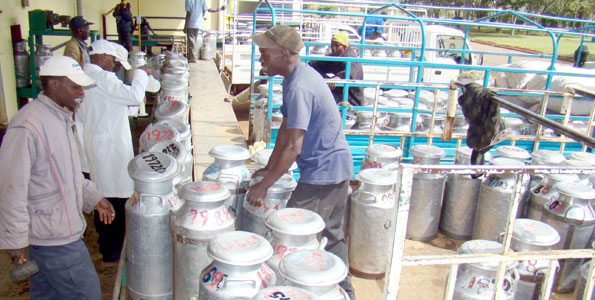Githunguri Dairy: When 31 disgruntled dairy farmers decided to contribute Sh. 1 each for every litre of milk sold and register a co-operative in 1961, there was no telling that they were laying the foundation for a multi-billion-shilling business.
The enterprise that became Githunguri Dairy Farmers Co-operative Society in 2013 grossed Sh. 6 billion in annual turnover and has attracted a couple of buyout bids.
Originally, the idea was to find a lasting solution to the persistent milk price volatility. But the more they pushed on, the deeper they sank into financial difficulties, forcing them to increase their contributions from one to two shillings.
Although this did not unlock their expected success, it hardened their resolve to push on.
Uhuru’s media house broke, unable to pay fired employees their dues
“At that time, our credit-worthiness was nearly zero and no bank was willing to finance our business plan. Nearly all our applications for loans were turned down,” says Charles Mukora, the society chairman.
“The problem with Kenyan banks is that they present themselves as very close to potential customers but, practically, are very far from that reality.”
Unbowed and with no clear capital outlay to set up a processing plant, the membership enrollment went up, as did milk supply.
The society decided that they would supply the milk to the then market leader — the Kenya Cooperative Creameries (KCC) — and a local hotel.
“It was a desperate move and we had to start working with what was readily available. The profits were not forthcoming yet this was the only source of livelihood for most members,” says Mr Mukora.
Then the worst happened when KCC collapsed in the early 1990s, sending the society back to the drawing board.
“This was our lowest moment and we decided to raise capital and set up our own milk plant,” says Mr Mukora, who became a member of Githunguri Dairy while a student at Kenyatta University.
“We had no collateral but successfully approached Oikocredit International for possible funding and got Sh90 million.”
Oikocredit is a global co-operative and social investor that provides funding to small and medium enterprises to enhance business growth and development.
In 2004, Githunguri Dairy Farmers Co-operative Society went commercial with the first processing plant that produced Fresha whole milk, its flagship product.
It produced 18,000 litres of milk daily, selling it in Nairobi and its environs. That capacity had since increased to 220,000 litres from a workforce of 8,000 as of July last year.
Meanwhile, its market had expanded beyond the borders to neighbouring South Sudan and Tanzania where the society has 23,000 members with 40,000 dairy cattle. Currently, Githunguri Dairy does not buy milk from non-members. Mr Mukora says the society has chosen to grow on existing products instead of introducing new ones.
“We will soon be diversifying and we will set up a milk powder plant but this must go in line with what is relevant in the market.”
John Kilonzo, the general manager, explains: “We appreciate growth in terms of innovation but you don’t rush to the market with a new product just because you made a profit and you want to present a new item.”
The huge investment associated with the powder plant has forced the milk processor to think of outsourcing its production.
The dairy farm is also set to diversify into the bottled water and cheese markets by the end of the year, targeting local and regional markets.
“We have done the feasibility study and identified that there is an untapped market out there,” says Mr Kilonzo, adding that dairy farming in Githunguri has positively impacted on the locals who have uprooted coffee in favour of the milk business.
To strengthen the loyalty of members, Githunguri Dairy has set up a savings and credit cooperative society (Sacco) to offer soft loans to members whenever they have a financial challenge.
“We have also helped members own parcels of land where they can reinvest the proceeds of the business. This comes in the form of bonuses and dividends paid as a motivation to increase daily production,” Mr Mukora says.
In recent years, however, Githunguri Dairy has faced a challenge in the mushrooming of small dairies across the country that are eating into its market.
“Few of these new operators are keen on quality and this enables them to retail their products at very low prices, taking a good percentage of milk consumers,” says Mr Mukora.
The milk market is also fraught with punitive policies both locally and regionally, making it hard for startups and established companies to enter new markets.
More recently, the introduction of value added tax (VAT) on milk has adversely affected uptake in most homes, shrinking the market.
Mr Mukora, however, attributes the success of the dairy operation to absence of political interference and boardroom wars.
“We also have 12 training sessions every month targeting dairy farmers on milk hygiene and farm management given the high competition in the market,” he says.
The following feature was first published in the Business Daily.










